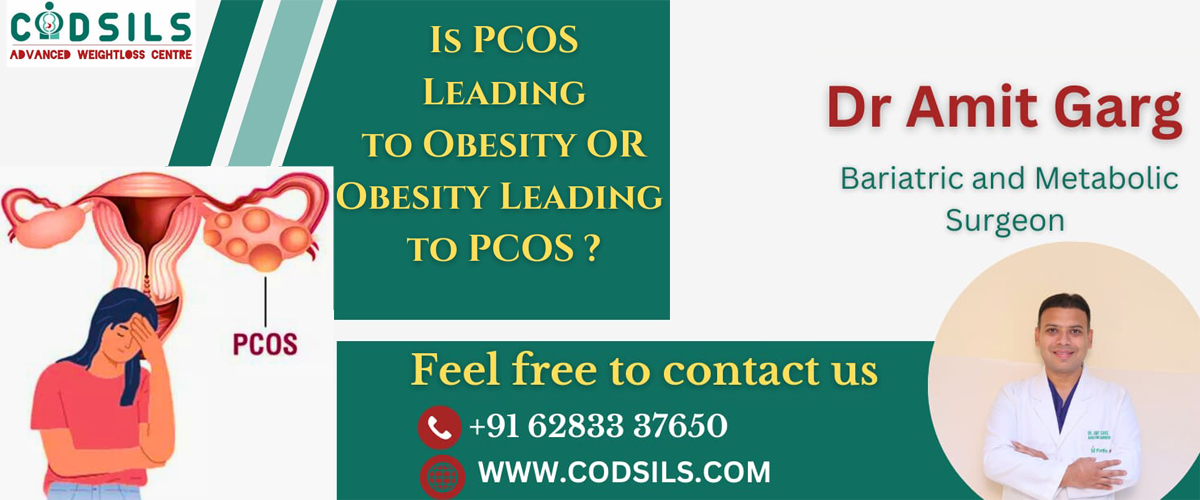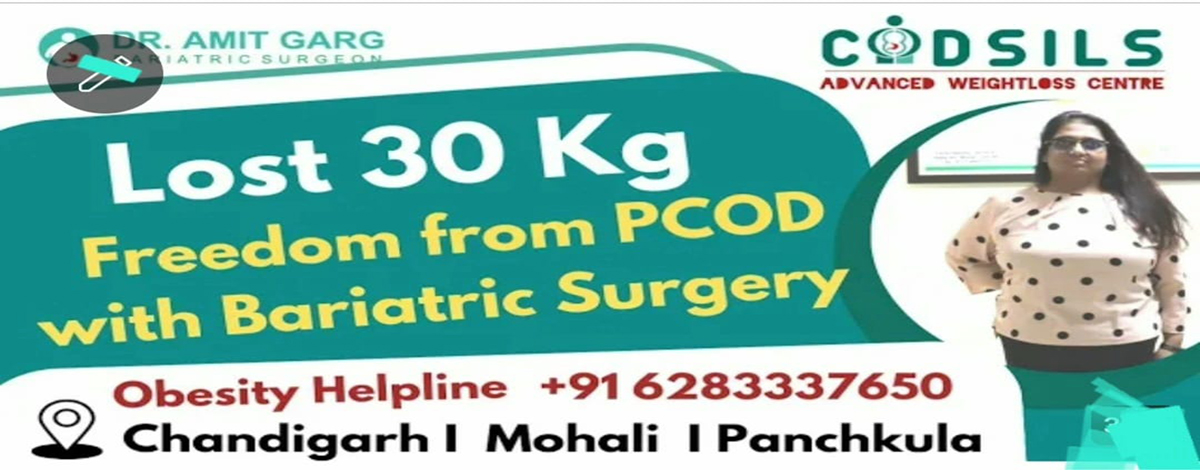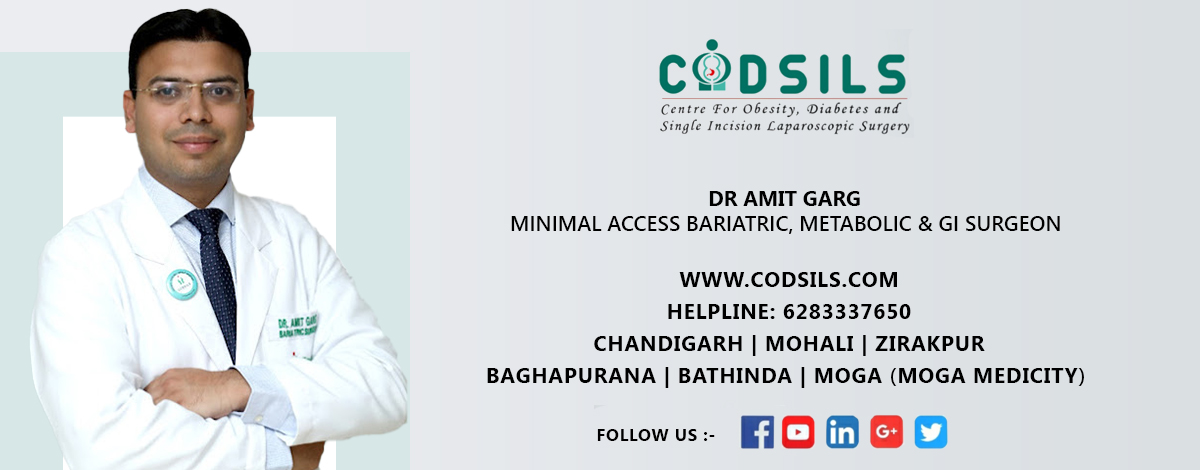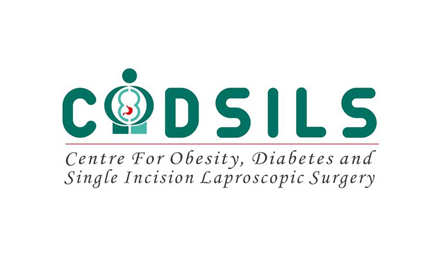
10 Oct PCOD/ PCOS and Obesity treatment in Mohali
Are you struggling with PCOD and weight gain? 
Imagine breaking free from the frustrating symptoms of PCOD and finally achieving your weight loss goals. Dr. Garg’s comprehensive approach combines cutting-edge medical expertise with personalized treatment plans, offering a beacon of hope for those who’ve struggled with traditional methods. From non-invasive techniques to advanced bariatric surgery options, his holistic strategy addresses both PCOD and obesity head-on.
In this blog post, we’ll explore the intricate relationship between PCOD and obesity, dive into Dr. Amit Garg’s exceptional credentials, and uncover the range of solutions available to help you reclaim your health and confidence. Whether you’re considering bariatric surgery or seeking alternative weight loss methods, you’ll discover how Dr. Garg’s expertise can guide you towards a healthier, happier you. Let’s embark on this transformative journey together!
Understanding PCOD and Its Link to Obesity
Defining PCOD and its symptoms
Polycystic Ovary Syndrome (PCOD), also known as Polycystic Ovarian Syndrome (PCOS), in Mohali is a common hormonal disorder affecting women of reproductive age. This condition is characterized by an imbalance in reproductive hormones, leading to various symptoms and health complications.
Common symptoms of PCOD include:
- Irregular menstrual cycles
- Excessive hair growth (hirsutism)
- Acne
- Weight gain
- Difficulty losing weight
- Thinning hair or hair loss
- Skin darkening (acanthosis nigricans)
- Fertility issues
The cyclical relationship between PCOD and obesity
PCOD and obesity have a complex, bidirectional relationship. This means that each condition can exacerbate the other, creating a challenging cycle for those affected.
| PCOD’s impact on obesity | Obesity’s impact on PCOD |
| Hormonal imbalances lead to weight gain | Excess fat tissue increases hormone production |
| Insulin resistance causes difficulty in losing weight | Weight gain worsens insulin resistance |
| Metabolic changes affect fat storage | Increased inflammation affects ovarian function |
How PCOD contributes to weight gain
PCOD contributes to weight gain through several mechanisms:
- Insulin resistance: PCOD often causes insulin resistance, leading to increased fat storage and difficulty in metabolizing carbohydrates.
- Hormonal imbalances: Elevated levels of androgens (male hormones) can promote weight gain, particularly around the midsection.
- Altered metabolism: PCOD can slow down the body’s metabolic rate, making it harder to burn calories efficiently.
- Increased appetite: Hormonal fluctuations may lead to increased cravings and appetite, contributing to overeating.
Understanding these connections is crucial for effective management of both PCOD and obesity. With this knowledge, patients can work with healthcare professionals like Dr. Amit Garg to develop targeted treatment strategies that address both conditions simultaneously.
Dr. Amit Garg : Expert in Obesity treatment
Dr. Amit Garg has established himself as a leading authority in the treatment of PCOD-related obesity, combining extensive experience with a patient-centered approach. His expertise has transformed the lives of numerous individuals struggling with these interconnected conditions.
Success Stories and Patient Testimonials
Dr. Garg’s impact on patients’ lives is best illustrated through their own words:
- “Dr. Garg’s treatment plan helped me lose 30 kg and regain control of my PCOD symptoms.” – Priya Sharma.
- “I never thought I could overcome obesity with PCOD, but Dr. Garg’s approach made it possible.” – Anita Rai.
- “Thanks to Dr. Garg, I’ve not only lost weight but also improved my overall health.” – Meera Tandon.
Specialized Approach to Treating PCOD-related Obesity
Dr. Garg’s unique approach combines medical expertise with personalized care:
- Comprehensive assessment of PCOD and obesity factors
- Tailored treatment plans addressing both conditions simultaneously
- Integration of lifestyle modifications, medication, and surgical options when necessary
| Treatment Component | Benefits |
| Nutritional Guidance | Balanced hormones, weight management |
| Exercise Regimen | Improved insulin sensitivity, fat loss |
| Medication (if needed) | Symptom management, metabolic regulation |
| Surgical Intervention | Significant weight loss, PCOD symptom improvement |
Dr. Garg’s Qualifications and Experience
With over 15 years of dedicated practice in weight loss and bariatric surgery, Dr. Garg brings unparalleled expertise to PCOD and obesity management:
- Board-certified in Bariatric and Metabolic Surgery
- Fellowship training in Advanced Laparoscopic and Bariatric Surgery
- Regular contributor to international medical journals on PCOD and obesity
- Invited speaker at global conferences on weight management and hormonal disorders
Dr. Garg’s commitment to continuous learning and patient care has positioned him as a trusted expert in the field. His holistic approach not only addresses the physical aspects of PCOD and obesity but also considers the emotional and psychological factors, ensuring comprehensive care for each patient.
Comprehensive Weight Loss Solutions for PCOD Patients
Now that we understand the link between PCOD and obesity, let’s explore the comprehensive weight loss solutions that Dr. Amit Garg offers to his patients.
A. Stress management techniques
Stress can significantly impact hormone levels and exacerbate PCOD symptoms. Dr. Garg emphasizes the importance of stress management in weight loss for PCOD patients. Here are some effective techniques:
- Meditation and mindfulness practices
- Deep breathing exercises
- Yoga and gentle stretching
- Progressive muscle relaxation
Journaling or expressive writing
B. Hormonal therapy options
Hormonal imbalances play a crucial role in PCOD. Dr. Garg may recommend various hormonal therapy options based on individual patient needs:
| Therapy Type | Purpose | Common Medications |
| Oral contraceptives | Regulate menstrual cycles | Combined estrogen-progestin pills |
| Anti-androgens | Reduce excess male hormones | Spironolactone, Flutamide |
| Insulin-sensitizing agents | Improve insulin resistance | Metformin |
C. Tailored exercise regimens
Exercise is crucial for weight loss and managing PCOD symptoms. Dr. Garg designs personalized exercise plans that may include:
- Moderate-intensity cardio (e.g., brisk walking, cycling)
- High-intensity interval training (HIIT)
- Strength training to build lean muscle mass
- Low-impact exercises like swimming or Pilates
D. Personalized diet plans
A balanced diet is essential for managing PCOD and promoting weight loss. Dr. Garg creates individualized meal plans that focus on:
- Reducing refined carbohydrates and sugars
- Increasing fiber intake through whole grains and vegetables
- Incorporating lean proteins and healthy fats
- Proper portion control and meal timing
By combining these comprehensive weight loss solutions, Dr. Amit Garg helps PCOD patients achieve sustainable results and improve their overall health. Next, we’ll explore bariatric surgery as a potential treatment option for those who may require more intensive intervention.

Bariatric Surgery as a Treatment Option
As we explore treatment options for PCOD and obesity, bariatric surgery emerges as a powerful solution for those who meet specific criteria. Dr. Amit Garg, a renowned weight loss and bariatric surgeon, offers this advanced treatment to help patients achieve significant and lasting results.
A. Pre and post-operative care
Dr. Garg emphasizes the importance of comprehensive care throughout the bariatric surgery process:
- Pre-operative preparation:
- Nutritional counseling
- Psychological evaluation
- Medical tests and assessments
- Post-operative support:
- Regular follow-up appointments
- Dietary guidance
- Exercise recommendations
- Emotional support
B. Candidacy criteria for surgery
Not everyone is an ideal candidate for bariatric surgery. Dr. Garg carefully evaluates patients based on the following criteria:
| Criteria | Description |
| BMI | Generally 40+ or 35+ with obesity-related conditions |
| Age | Typically between 18 and 65 years old |
| Health status | No severe medical conditions that increase surgical risk |
| Previous attempts | Documented history of failed weight loss attempts |
| Commitment | Willingness to make long-term lifestyle changes |
C. Benefits of bariatric surgery for PCOD patients
Bariatric surgery can offer significant advantages for PCOD patients:
- Substantial weight loss
- Improved insulin sensitivity
- Regularization of menstrual cycles
- Increased fertility
- Reduction in PCOD symptoms
D. Types of bariatric procedures offered
Dr. Amit Garg offers several bariatric surgery options, tailored to each patient’s needs:
- Gastric bypass: Reduces stomach size and reroutes the digestive tract
- Sleeve gastrectomy: Removes a portion of the stomach, creating a smaller, sleeve-shaped stomach
- Adjustable gastric banding: Places an adjustable band around the upper part of the stomach
Each procedure has its own benefits and considerations, which Dr. Garg discusses in detail with his patients to determine the most suitable option.
Holistic Approach to PCOD and Obesity Management
Dr. Amit Garg’s holistic approach to managing PCOD and obesity focuses on addressing the interconnected aspects of these conditions. This comprehensive strategy ensures long-term success and improved quality of life for patients.
Regular Follow-ups and Monitoring
Regular check-ups are crucial for tracking progress and making necessary adjustments to treatment plans. Dr. Garg emphasizes the importance of:
- Periodic health assessments
- Blood tests to monitor hormone levels
- Body composition analysis
- Reviewing dietary habits and exercise routines
Psychological Support and Counseling
Addressing the emotional and mental aspects of PCOD and obesity is essential for sustainable results. Dr. Garg’s approach includes:
- Individual counseling sessions
- Group therapy options
- Stress management techniques
- Body image workshops
Long-term Lifestyle Modifications
Sustainable changes are key to managing PCOD and obesity effectively. Dr. Garg guides patients through:
- Customized nutrition plans
- Tailored exercise regimens
- Sleep hygiene improvements
- Stress reduction strategies
Integrating Medical and Surgical Interventions
When necessary, Dr. Garg combines medical treatments with surgical options for optimal results:
| Medical Interventions | Surgical Options |
| Hormone therapy | Laparoscopic ovarian drilling |
| Insulin-sensitizing medications | Bariatric surgery |
| Ovulation induction | Metabolic surgery |
By integrating these various aspects, Dr. Amit Garg ensures a comprehensive and personalized approach to managing PCOD and obesity, leading to improved health outcomes and enhanced quality of life for his patients.
PCOD and obesity are interconnected health issues that require expert management for effective treatment. Dr. Amit Garg, a renowned weight loss and bariatric surgeon, offers comprehensive solutions for patients struggling with these conditions. His approach combines medical expertise with personalized care, addressing both the physical and emotional aspects of PCOD and obesity.
For those seeking lasting results, Dr. Garg provides a range of options, from non-invasive weight loss techniques to advanced bariatric surgeries. By adopting a holistic approach, he empowers patients to take control of their health and achieve sustainable weight loss. If you’re battling PCOD and obesity, consider consulting Dr. Amit Garg to explore tailored treatment plans that can transform your life and improve your overall well-being.



